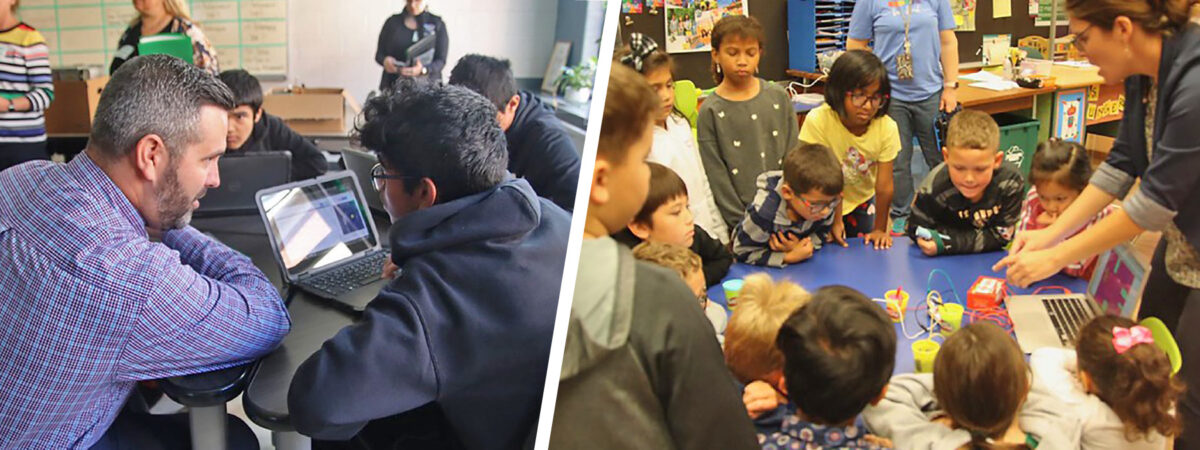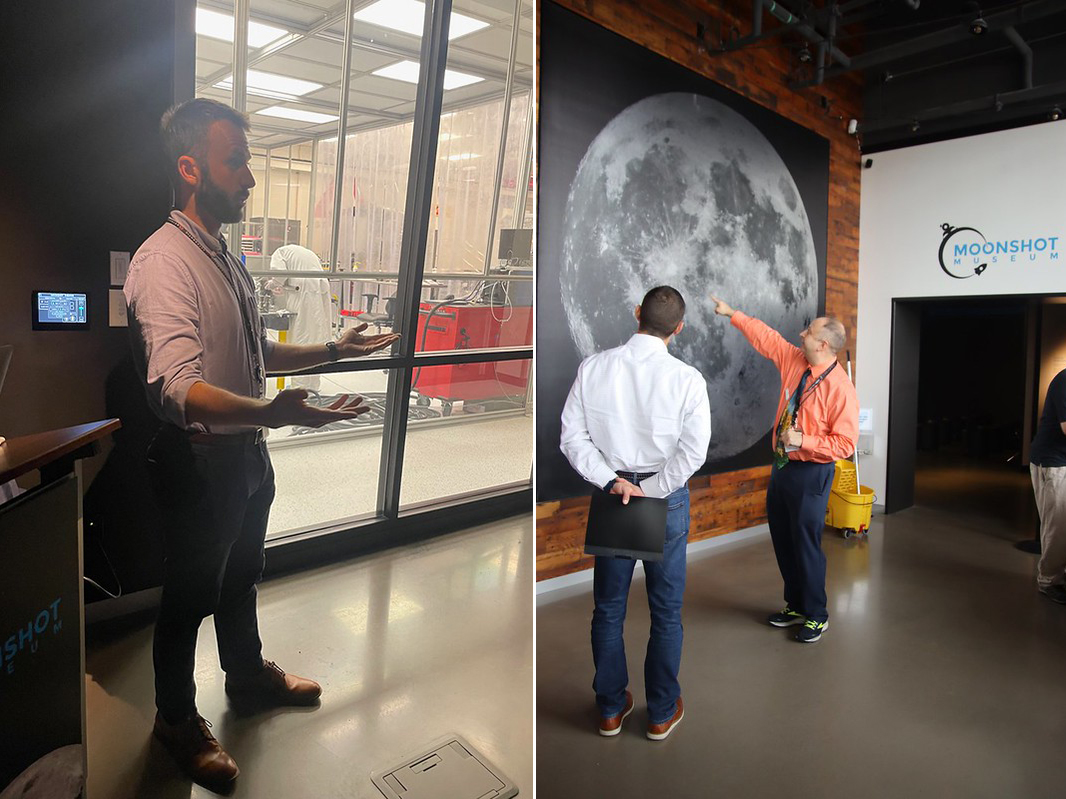

Observing Astrobotic’s clean lab where the Peregrine and Griffin landers are being prepared for their
journey to the Moon and taking a closer look at their landing trajectory through a visit to the Moonshot Museum.
What better way to visualize the future of work than to take a step into the future? Astrobotic is a space robotics company in Pittsburgh that delivers payloads to the moon and develops advanced space robotics capabilities—an inspiring place to watch the future unfold before your eyes.
In a pilot project with Digital Promise’s Computational Thinking (CT) Pathways program, Pennsylvania’s Quakertown Community School District is reimagining education by building a district-specific K-12 Computational Thinking Pathway while simultaneously studying the future of work and the impact this has on the development of its portrait of a graduate.When supporting districts in developing their unique computing pathways, Digital Promise helps connect districts to their greater vision for students through a competency-based approach, focusing not simply on coding but rather the underlying computing competencies underpinning the future of work such as “working with data” and “understanding patterns systematically” that stretch across grades K-12.

The Leadership Team believed that engaging with students was one of the most important outcomes of their visit.
Quakertown Community School District is a public school district located in Quakertown, Pennsylvania, in Upper Bucks County, serving 4,736 students in grades K-12. Guided by Quinn Burke, director of computational thinking at Digital Promise and supported by Aileen Owens, education consultant, the Quakertown team began a systematic investigation of computational thinking several weeks prior to visiting Pittsburgh. Digital Promise then set the stage for a vision-casting exercise on the future of work by bringing the Quakertown Community School District Leadership Team to the Moonshot Museum to meet with Mike Hennessy, Manager of Learning and Programs, to learn about the emerging future of lunar exploration, science, and commerce. The team also met with Justin Powell, Technical Writer at Astrobotic, to learn about innovative technologies in the commercial space industry. While meeting with a member of Astrobotic they observed engineers assembling the Peregrine lander, which will be the first American spacecraft to soft land on the Moon since the Apollo program. Alongside the Peregrine the team observed the Griffin lander which will soon be delivering NASA’s water-hunting rover VIPER to the Moon.
Superintendent Dr. Matthew Friedman describes Quakertown’s vision as multifaceted: “We realize that the foundation for preparing students to be successful problem-solvers is to build computational thinking as the new literacy while building this methodology into all discipline areas. Through our strategic planning process, we are aligning the Portrait of a Graduate with CT competencies, skills, and dispositions to ensure our students are successful in the future of work.”
During the second day of their visit to Pittsburgh, the Quakertown team spent the day at South Fayette School District—a member of the Digital Promise League of Innovative Schools—to experience a K-12 CT Pathway in action, speaking with students and teachers in the classrooms. Connecting the CT skills and competencies to curriculum, Michael Zackon, director of secondary education at Quakertown, said, “The visit to South Fayette brought the theoretical to life and created an entirely different conversation than where we were when we started in this process.”

Students engaged in discussions about CMU CS Academy’s graphics-based computer science curriculum which allows students to be creative while learning Python.
Through this pilot, Quakertown Community School District will work with Digital Promise’s team to develop a K-12 Computational Problem Solving Pathway, providing regular ongoing feedback and input along the way. Upon the pilot’s conclusion, the model will be expanded to other districts who are part of a growing CT Pathways cohort who are implementing comprehensive K-12 computing pathways.
To advance this work, Quakertown is engaging their current leadership team and identifying ways to strengthen and grow the team while addressing the development of classroom teachers and community stakeholders in this process. The team will continue to delve into the skills, competencies, and practices needed to successfully prepare students for the future of work. Through this pilot, the Quakertown leadership team will continue to align and map out their CT Pathway based on this methodology for the next several months, with support from Digital Promise.

Second graders became the teachers and helped the Leadership Team learn to program motors and sensors to accomplish a task.
Now more than ever, there is a national push for district pathways in computational thinking and computer science. The skills and practices requiring computational thinking are broad, leveraging concepts and skills from computer science and applying them to other contexts, such as core academic disciplines (e.g. arts, English language arts, math, science, social studies) and everyday problem solving. Districts across the country are tasked with designing inclusive computational thinking and computer science learning themselves, with only minimal guidance from states and other agencies.

Members of the Leadership Team had the opportunity to explore what it’s like to experience computer science from a girl’s perspective.
Digital Promise has collaborated with a wide range of school districts including 10 districts over nine different states (2022) through a series of projects supported by the National Science Foundation (NSF) and other funders to develop systematic and holistic K-12 computing pathways. These partnerships have produced three important products, available for other districts to explore and use:
If you are interested in learning more about this work or participating in a similar pilot please reach out to Quinn Burke at qburke@digitalpromise.org.
Photos provided by Norton Gusky, NLG-Consulting, LLC, www.nlg-consulting.net twitter.com/ngusky

We want to hear from you!
Please take this 5-minute survey and help us serve you better.
